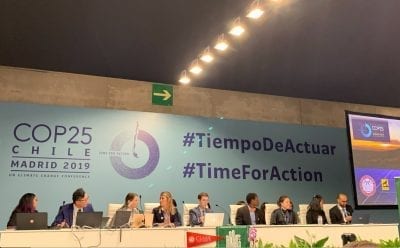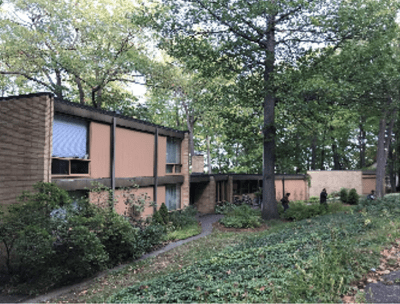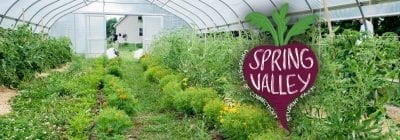Editor’s Note: We must rethink how we structure our society and create our buildings. Building a greener, more sustainable world, is crucial if we hope to mitigate the effects of our changing environment.
Need vs. Greed: Balancing Economic Development and Sustainability – Spencer Kinyon
Sustainable Development and Youth Partnership – Sarah Schechter
Need vs. Greed: Balancing Economic Development and Sustainability
Spencer Kinyon – B.S. Political Science and Economics
Throughout COP25, UConn students had the unique opportunity to talk with people from different countries and organizations about the discovery and implementation of solutions to climate change. On the last day we attended COP25, myself and two other UConn students had the chance to interview C.K. Mishra, who is the Secretary of the Ministry of Environment, Forest and Climate Change for India. Secretary Mishra discussed how climate change is impacting India and the solutions involving mitigation and adaptation that the nation is pursuing. With over one billion people, India is an extremely large economy that is constantly growing. Therefore, India has had to find a way to balance economic development with sustainability.

Under the Paris Climate Agreement, every country established Nationally Determined Contributions (NDCs), whereby each country agreed to reduce their emissions by a specific amount. Currently, India is only one of four countries that is on pace to fulfill its nationally determined contributions. As a result, Secretary Mishra stated that the country is pursuing “sustainable growth” in order to meet the needs and demands of the people, while thinking about their impact. Secretary Mishra highlighted that India is pursuing a goal of 40% renewable electricity by 2022 and moving away from coal to renewable energy.
Our conversation was fantastic because it allowed me to better understand how leaders in government are thinking about climate change and its real effects. He highlighted the point that individuals want to be sustainable, but also want cars. As a result, people’s lifestyles must change Secretary Mishra further inspired us to think of Mahatma Gandhi quote: “The world has enough for everyone’s need, but not enough for everyone’s greed.” I believe that Mahatma Gandhi’s message is one that everyone in the world should be thinking about. We might not all be from the same country, but we all share this world, and we need to ensure that our world is sustainable.

In a separate discussion at the Chile pavilion, I learned that one of the methods through which India is pursuing climate adaptation is using artificial intelligence. Google has developed an initiative called “AI for Social Good”, whereby the company partners with governments and organizations to develop methods to use artificial intelligence to address problems in the world. Carla Bromberg, who is the Program Lead of AI for Social Good at Google, spoke of how they have accepted many projects related to climate change. Due to the increase in flooding r elated to climate change, Google partnered with the government of India to improve flood forecasting. Using data provided by India’s government, Google is able to utilize machine learning to forecast flooding and then notify people about potential floods. I found this use of artificial intelligence and data to be a fantastic method to adapt to climate change. It was inspiring to hear about Google’s efforts to use their technology to better the world and potentially save people’s lives.
Spencer is a Senior from Cheshire, Connecticut pursuing a degree in Political Science and Economics.
Sustainable Development and Youth Partnership
Sarah Schechter – B.A. Environmental Studies and Anthropology
Student action on campus is powerful, present, and pushing universities towards progress. When youths have the opportunity to collaborate, there is no end to amazing projects that can be created.
This year UConn partnered with other institutions from the United States and had a booth where students could discuss the programs at their schools that related to COP25. Some of the students also spent the semester working on projects related to the Sustainable Development Goals (SDGs) and presented them during “SDGS for the SDGS: Students Doing Goal-Oriented Science for Sustainable Development Goals” on Tuesday, December 3.

I spent some time talking with two students, Alexis Pascaris and Adewale Adesanya from Michigan Tech, who were focusing on SDG #11: “Make cities inclusive, safe, resilient & sustainable.”
One of the case studies they discussed, was the implementation of a Sustainable Demonstration House (SDH) at the university. This building, first constructed in 1979, has been more recently renovated with the help of the Alternative Energy Enterprise in order to make it more sustainable and energy efficient. Changes included adding solar panels, installing low-flow faucets, switching to LED bulbs, performing a blower test to check for heat leaks, committing to composting, recycling, and utilizing aquaponics. A small group of students live in and maintain the SDH, ensuring that tasks are being carried out. https://drive.google.com/file/d/1nDxTl61OTnuNOKuNk-ptNBKResNzIFWn/view?usp=sharing

After learning about the feature of the SDH at Michigan Tech, it sounded very similar to many of the sustainable actions at Spring Valley Student Farm at UConn.
At the farm there is the use of solar power, composting, recycling, some implementation of aquaponics for a period of time, beekeeping and also the students grow a great deal of food that is then distributed at Whitney Dining Hall.
Additionally, other students from campus have the opportunity to get involved with the farm through Farm Fridays, attending the Spring Valley Student Farm Club, or through the EcoHouse learning community. This interaction allows the farmers to share their sustainable lifestyles with the rest of campus, which will hopefully encourage others to do the same.
I was very interested to listen to the presentation and see that Michigan Tech and UConn have been working on similar projects. It is the hope that these projects will continue to spread throughout each school and in others as well.
